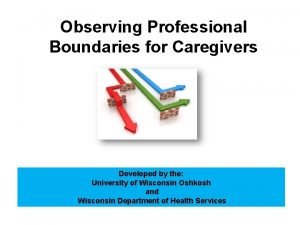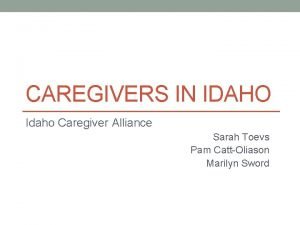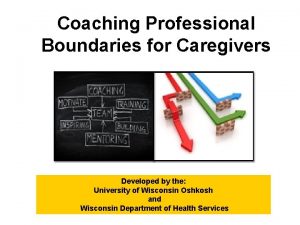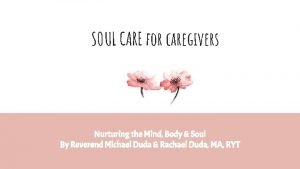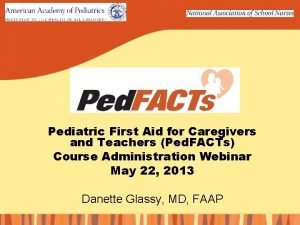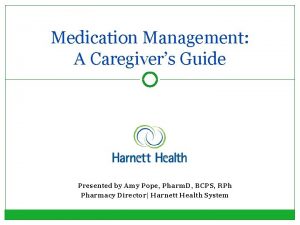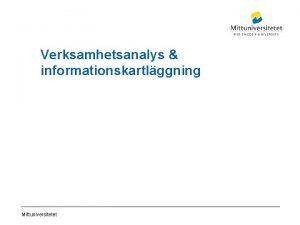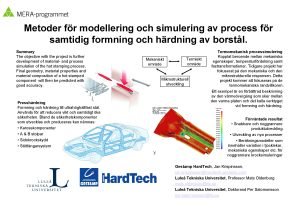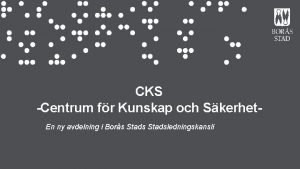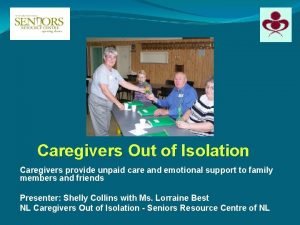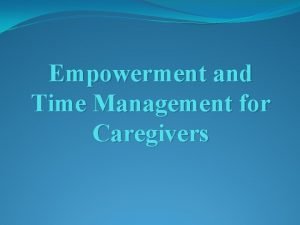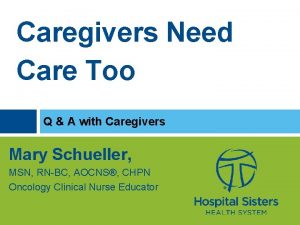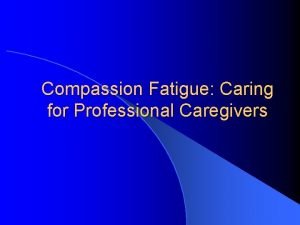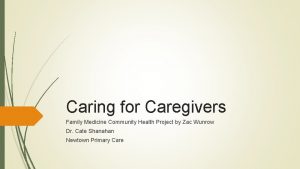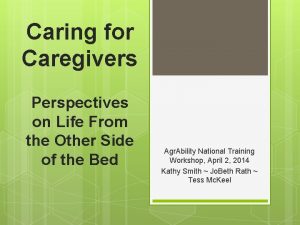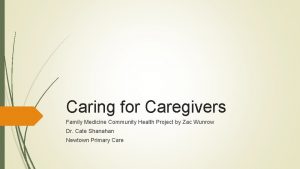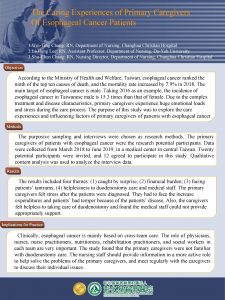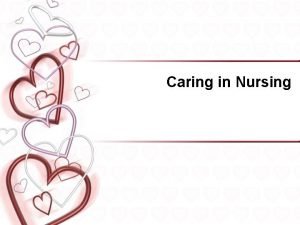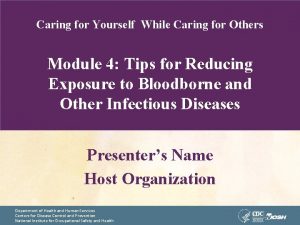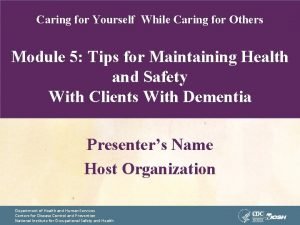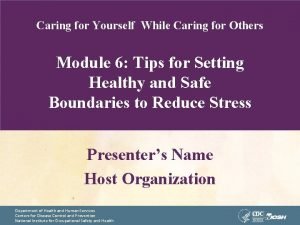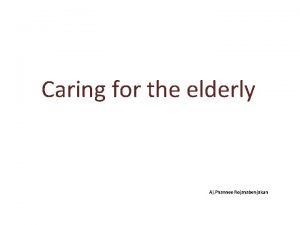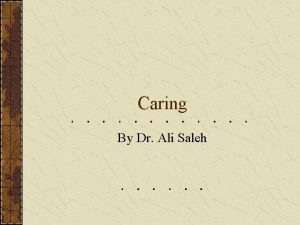The Clinical Importance of Caring for Caregivers Its

























- Slides: 25

The Clinical Importance of Caring for Caregivers – It’s Not Just Doing Good, It’s Also Doing Well Mary Guerriero Austrom, Ph. D Wesley P Martin Professor of AD Education Department of Psychiatry Indiana Alzheimer Disease Center Associate Dean of Diversity Affairs Indiana University School of Medicine

Disclosures and Acknowledgments • Indiana ADC funded by NIA P 30 AG 10133 • ADMIT Study supported by NIA R 01 AG 034946 • Centers for Medicare & Medicaid Services 1 C 1 CMS 331000 -01 -00 Department of Health & Human Services • DEMA Study supported by NINR 1 R 21 NR 013755 -01

Overview • Who are the caregivers • What do caregivers want and need • Emotional and physical consequences of caregiving • Interventions

Who are the caregivers? • Approximately 66% are women. • 34% are 65 or older. • Over 66% of caregivers are married, living with a partner or in a long-term relationship. • More than 66% of caregivers are non-Hispanic white. • 10% are African-American. • 8% are Hispanic. • 5% are Asian. • Over 40% have a college degree or higher.

Who are the caregivers? • 41% have a household income of $50, 000 or less. • Over 50% of primary caregivers who indicate having the most responsibility for helping their relatives— 55% take care of parents. • 27% caregivers live with the care recipient • 46% live within 20 minutes of the care recipient • ~250, 000 children and young adults between ages 8 and 18 provide help to someone with AD or other dementia

Why caregivers do what they do… • Three reasons caregivers decide to provide care and assistance to a person with AD: Ø 65% want to keep a family member/friend at home Ø 48% live with/near person with dementia caregiver’s Ø 38% till death us do part--spouse or partner

What do caregivers do? • Dementia caregivers report providing 27 hours more care per month on average (92 hours vs 65 hours) than caregivers of people without dementia. • Other studies suggest that primary family caregivers provide particularly extensive amounts of care: Ø 2011 report found that primary family caregivers of people with dementia reported spending an average of 9 hours/day providing help/care Ø Many caregivers provide help alone Ø 41% dementia caregivers in 2014 Alzheimer’s Association poll reported no else provided unpaid care

One of the greatest human needs is to be understood… to feel you have been listened to and heard.

Family caregivers are important… • Are often the source of referral • Are reliable and provide valuable information for diagnosis and treatment • Make the decision about participation in research protocols • Need to be acknowledged for their role, service and journey

Caregivers … • Often participate in mutual pretense with patient…denial, denial • Often make the patient more dependent than necessary because they care so much • Have most difficulty making the tough decisions and plans Ø Legal/financial decisions Ø Driving cessation Ø Living arrangements Ø End of life decisions

What caregivers want… • Not to feel abandoned. • Want to know that they will have the support and help with care if they need it. • Want their questions answered even though they haven’t asked them yet. • Want hope. • Need some respite.

What do caregivers say about PCPs? • Dr. said it was probably AD and that was it. • Dr. did not offer us any help or information. • Dr. did not tell us about any treatments, options or research trials to try. • Dr. did not recommend a referral to a specialist. • Dr. told us he was “just getting old” and not to worry about it. • Dr. did not discuss brain donation.

Impact of caregiving • Although caregivers report some positive feelings about caregiving such as family togetherness and the satisfaction of helping others, they also report high levels of stress when providing care: Ø 8% of dementia caregivers vs. 6% of non-dementia caregivers indicate significant negative effects of caregiving. Ø Twice as many dementia caregivers indicate substantial financial, emotional and physical difficulties. Ø 59% of dementia caregivers rate the emotional stress of caregiving as high or very high.

Impact of caregiving • Caregivers most likely to indicate stress were women, older, living with the patient and white or Hispanic. • 2014 Alzheimer’s Association poll found caregivers often believed they had no choice in taking on the role of caregiver. • When caregivers report being stressed due to behavioral symptoms, it increases probability they will seek nursing home care. Ø They feel very guilty about that decision Ø Transfer their role to LTC Ø Placement does not reduce stress for many Ø Placement decision was more difficult than death of patient

Impact of caregiving • Demands of caregivers may increase as patient approach end of life. • Year before person’s death, 59% caregivers felt they were “on duty” 24 hours/day. • Many rated caregiving during this time as extremely stressful. • A study of end-of-life care found that 72% of family caregivers experienced relief when patient died. Often feel guilt about being relieved. • REACH II found that stress/depression did not abate following death of patient

Physical impact of caregiving • Reports of increased physical strain, higher morbidity and mortality among dementia caregivers • Dementia caregiving is complex Ø Simply providing care to someone with AD or other dementia may not consistently result in stress or negative health problems Ø Stress of dementia caregiving is influenced by number of other factors § § § Dementia severity How challenging caregivers perceive certain aspects of care Availability of social support Caregiver personality Other demands and roles

First Line Non-pharmacologic Interventions • • • Activity and recreation Caregiver education Staff training Exercise and movement Sensory enrichment Music therapy • • Aromatherapy Simulated family presence Validation therapy Reminiscence therapy De Oliveira et al. Biomedical Research International 2015 O'Connor et al. International psychogeriatrics / IPA. 2009; 21(2): 241 -51.

Interventions that help • Interventions aim to improve the health and well-being of dementia caregivers by relieving the negative aspects of caregiving. • Some also aim to delay nursing home admission of the person with dementia. • Specific approaches used in various interventions include: Ø helping caregivers manage dementia-related symptoms Ø improving social support for caregivers Ø providing caregivers with respite from caregiving duties Ø helping caregivers identify meaningful activities

Activity and Recreation • Daily chores, hobbies and shared past activities. • Improves mood, agitation, and quality of life. • 20 to 60 min of activity once per day. • More benefit if skill level and interests match patient. De Oliveira et al. Biomedical Research International 2015 O’Connor et al. International Psychogeriatrics 2009 Kolanowski et al. 2005 O’Connor, Rabins, Swanick et al. “Module -5 Non-Pharmacologic Treatments for BPSD” 2011 IPA.

Interventions that help • Effective interventions: Ø Assist caregivers over long periods Ø Approach dementia care as an issue for the entire family Ø Train dementia caregivers in the management of behavioral problems. • Multicomponent approaches: Ø Combine individual and family counseling Ø Education and other support over time to help caregivers manage changes as dementia progresses • Examples: Ø ADMIT Study Ø DEMA Ø CMS-ABC Medical Home/Collaborative Care Models Ø New York University Caregiver Intervention Ø Resources for Enhancing Alzheimer’s Caregiver Health (REACH II) Ø Savvy Caregiver Ø Adult Day Programs

Good copers… • Engage in less denial Ø Suppression is a better strategy • • Have a sense of acceptance Are realistic Speak up and ask for help Break down tasks Take one day at a time Look for meaning in the role Have a positive attitude [distillation of cancer and dementia caregiving literature] 2/24/2021 20

Cure versus Care A distinction must be made between cure and care. While AD is not yet curable, it’s symptoms are treatable. We need to treat the patient and caregiver as a dyad…they are both our patients. Interventions must be comprehensive.

So what is the secret to managing in old age?

Collaborators Cathy Alder Malaz Boustani Christopher M Callahan Noll Campbell Martin Farlow Su Gao Hugh C Hendrie Frederick W Unverzagt.

Thank you. Questions?
 Dr. jean watson
Dr. jean watson Professional boundaries for caregivers
Professional boundaries for caregivers Idaho family caregiver conference
Idaho family caregiver conference Boundaries for caregivers
Boundaries for caregivers Caregivers
Caregivers Pediatric first aid for caregivers and teachers
Pediatric first aid for caregivers and teachers Caregivers guide to medication
Caregivers guide to medication One of the toughest parts of summarizing is
One of the toughest parts of summarizing is What is its importance?
What is its importance? Short speech
Short speech Tack för att ni lyssnade bild
Tack för att ni lyssnade bild Strategi för svensk viltförvaltning
Strategi för svensk viltförvaltning Romarriket tidslinje
Romarriket tidslinje Vad är verksamhetsanalys
Vad är verksamhetsanalys Matematisk modellering eksempel
Matematisk modellering eksempel Tack för att ni har lyssnat
Tack för att ni har lyssnat Läkarutlåtande för livränta
Läkarutlåtande för livränta Shivaiter
Shivaiter Ekologiskt fotavtryck
Ekologiskt fotavtryck Cks
Cks Inköpsprocessen steg för steg
Inköpsprocessen steg för steg Påbyggnader för flakfordon
Påbyggnader för flakfordon Anatomi organ reproduksi
Anatomi organ reproduksi Egg för emanuel
Egg för emanuel Relativ standardavvikelse formel
Relativ standardavvikelse formel Rutin för avvikelsehantering
Rutin för avvikelsehantering

